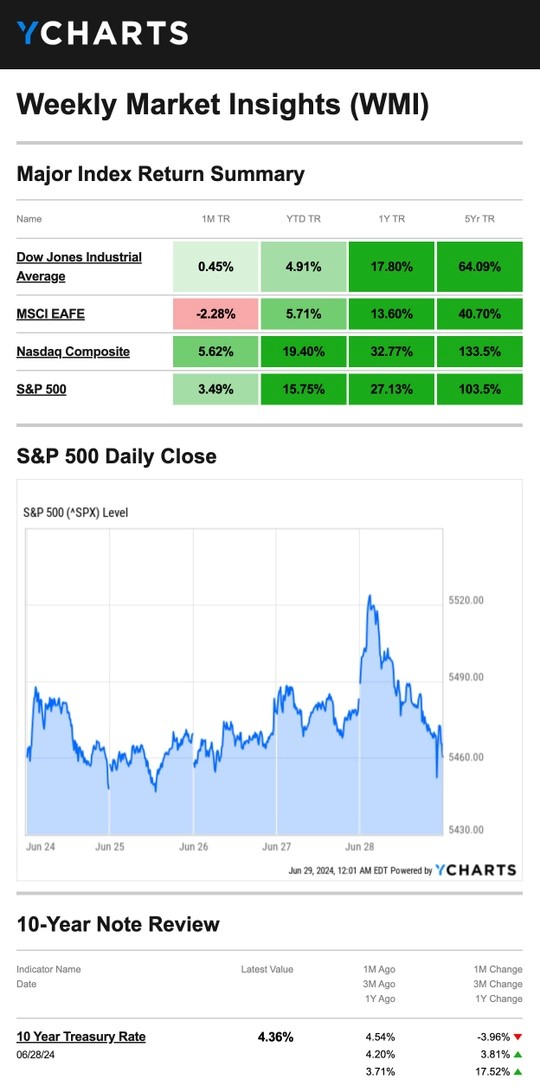Stocks finished the last week of June and Q2 mixed as investors digested a fresh round of economic data.
The Standard & Poor’s 500 Index slipped 0.08%, while the Dow Jones Industrial Average also dipped 0.08 percent. The tech-heavy Nasdaq Composite gained 0.24 percent. The MSCI EAFE Index tracks developed overseas stock markets and rose 0.27 percent for the week through Thursday’s close.1
Nasdaq Regains Lead
Last week opened with the S&P 500 and Nasdaq heading lower, while the Dow rallied on momentum from the prior week. But by mid-week, the leadership shifted with the Nasdaq pushing higher.2
With the back half of the week packed with fresh economic data, conflicting stories developed about the economy. New home sales fell 11.3 percent in May—the largest month-over-month drop in a year and a half—while the supply of new homes hit a 16-year high. Meanwhile, first-quarter GDP revised slightly to 1.4 percent higher, and durable goods increased in May.3,4,5
Friday’s personal consumption and expenditure (PCE) data showed that core inflation slowed to 0.1 percent in May over the prior month and 2.6 percent year-over-year—its lowest annual rate in three years. Both figures were in line with expectations. Stock prices initially rallied on the upbeat inflation news, but the early gains faded as the trading day progressed.6

| Source: YCharts.com, June 29, 2024. Weekly performance is measured from Monday, June 24, to Friday, June 28. TR = total return for the index, which includes any dividends as well as any other cash distributions during the period. Treasury note yield is expressed in basis points. |
Divergent Speakers
Federal Reserve officials have worked to communicate that despite the progress made on inflation in recent months, it remains above the Fed’s 2 percent target.
Last week, Fed Governor Michelle Bowman surprised the markets when she indicated, “I remain willing to raise the target range for the federal funds rate at a future meeting should progress on inflation stall or even reverse.” Fed Chair Powell, scheduled to speak on July 2, told investors on May 14, “I don’t think that it’s likely, based on the data that we have, that the next move that we make would be a rate hike.”7
This Week: Key Economic Data
Monday: ISM Manufacturing Index. Construction Spending.
Tuesday: Fed Chair Jerome Powell speaks. Motor Vehicle Sales. JOLTS.
Wednesday: Jobless Claims. International Trade in Goods and Services. FOMC Minutes.
Friday: Employment Situation. Fed Balance Sheet.
Source: Investors Business Daily – Econoday economic calendar; June 25, 2024
The Econoday economic calendar lists upcoming U.S. economic data releases (including key economic indicators), Federal Reserve policy meetings, and speaking engagements of Federal Reserve officials. The content is developed from sources believed to be providing accurate information. The forecasts or forward-looking statements are based on assumptions and may not materialize. The forecasts also are subject to revision.
This Week: Companies Reporting Earnings
Wednesday: Constellation Brands Inc. (STZ)
Friday: KalVista Pharmaceuticals, Inc. (KALV)
Source: Zacks, June 25, 2024
Companies mentioned are for informational purposes only. It should not be considered a solicitation for the purchase or sale of the securities. Investing involves risks, and investment decisions should be based on your own goals, time horizon, and tolerance for risk. The return and principal value of investments will fluctuate as market conditions change. When sold, investments may be worth more or less than their original cost. Companies may reschedule when they report earnings without notice.
1. The Wall Street Journal, June 28, 2024
2. The Wall Street Journal, June 28, 2024
3. CNBC.com, June 27-28, 2024
4. AP News, June 27, 2024
5. Reuters, June 26, 2024
6. CNBC.com, June 28, 2024
7. CNBC.com, June 25, 2024
8. IRS.gov, March 1, 2023
9. Eatingwell.com, January 29, 2023
Investing involves risks, and investment decisions should be based on your own goals, time horizon, and tolerance for risk. The return and principal value of investments will fluctuate as market conditions change. When sold, investments may be worth more or less than their original cost.
The forecasts or forward-looking statements are based on assumptions, may not materialize, and are subject to revision without notice.
The market indexes discussed are unmanaged, and generally, considered representative of their respective markets. Index performance is not indicative of the past performance of a particular investment. Indexes do not incur management fees, costs, and expenses. Individuals cannot directly invest in unmanaged indexes. Past performance does not guarantee future results.
The Dow Jones Industrial Average is an unmanaged index that is generally considered representative of large-capitalization companies on the U.S. stock market. Nasdaq Composite is an index of the common stocks and similar securities listed on the NASDAQ stock market and is considered a broad indicator of the performance of technology and growth companies. The MSCI EAFE Index was created by Morgan Stanley Capital International (MSCI) and serves as a benchmark of the performance of major international equity markets, as represented by 21 major MSCI indexes from Europe, Australia, and Southeast Asia. The S&P 500 Composite Index is an unmanaged group of securities that are considered to be representative of the stock market in general.
U.S. Treasury Notes are guaranteed by the federal government as to the timely payment of principal and interest. However, if you sell a Treasury Note prior to maturity, it may be worth more or less than the original price paid. Fixed income investments are subject to various risks including changes in interest rates, credit quality, inflation risk, market valuations, prepayments, corporate events, tax ramifications and other factors.
International investments carry additional risks, which include differences in financial reporting standards, currency exchange rates, political risks unique to a specific country, foreign taxes and regulations, and the potential for illiquid markets. These factors may result in greater share price volatility.
Please consult your financial professional for additional information.
This content is developed from sources believed to be providing accurate information. The information in this material is not intended as tax or legal advice. Please consult legal or tax professionals for specific information regarding your individual situation. This material was developed and produced by FMG Suite to provide information on a topic that may be of interest. FMG is not affiliated with the named representative, financial professional, Registered Investment Advisor, Broker-Dealer, nor state- or SEC-registered investment advisory firm. The opinions expressed and material provided are for general information, and they should not be considered a solicitation for the purchase or sale of any security.
Copyright 2024 FMG Suite.


